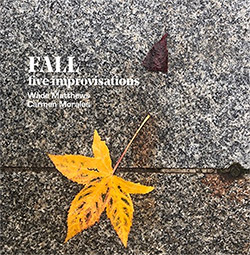
Nothing expresses the potential for humans to create a common ground for in-depth dialogue like improvisation revolving around the performers' individual awareness. A collection of five tracks recorded in a deconsecrated Spanish monastery by Carmen Morales on prepared piano, and Wade Matthews using digital synthesis and real-time processing of field recordings, Fall is an embodiment of this premise. It comprises a wide variety of resonant environments, kinetics with continually shifting interrelations, and serendipitous modifications in the state of sonic matter.
While any technically proficient improvising duo can produce a miscellany of timbres and dynamics, potentially attaining akin outcomes but often only superficially, it is also true that this pair's creative inquisitiveness is evident in every move they make. At the risk of a silly pun, Morales is in fact genuinely (and academically) prepared on the prepared piano. After years of study in Malaga and Stuttgart, her research thesis was actually titled The Physical-Acoustic Dimension of Prepared Piano. At just 32, she conveys an air of wisdom in the way she reacts to each instrument symptom as a caring doctor would to a patient's body signals. Matthews, a veritable electroacoustic scientist who can work with anything from wind instruments to the mind-boggling specifics of computer-based equipment, has put aside the composition studies of the past to privilege his capacity for quick thinking and lucid, imaginative responses to stimuli in a live setting.
The music is diverse, laden with beneficial tension, not devoid of instants of stillness but rather, more commonly, marked by integrations of organic and ultramodern. As early as the opening "Aspen," a small universe of microorganisms with autonomous organization, capable of generating a combination of advanced counterpoint and intelligent noisemaking, quickly replaces the tolling murmur of low strings softly struck by Morales in contrast to the mutinous emissions of Matthews' laptops. Although the latter underlines the desire to come up with a non-evocative type of construction, when speaking of "Plunge And Tumble" he himself refers to "the erratic scurrying of practically weightless, brittle and curled leaves blown haphazardly along the pavement by the first winds of impending winter". If we extrapolate the poetic element from the description while listening to the aural equivalent, we can deduce that the seeds of memory deposited in our souls have always been and continue to be subject to evolutionary processes. Accordingly, Fall's acoustic biodiversity, at times born — to quote Matthews' notes again — from the simple act of looking into each other's eyes before beginning to play, is at once impressive and reassuring.
Comments and Feedback:
|



